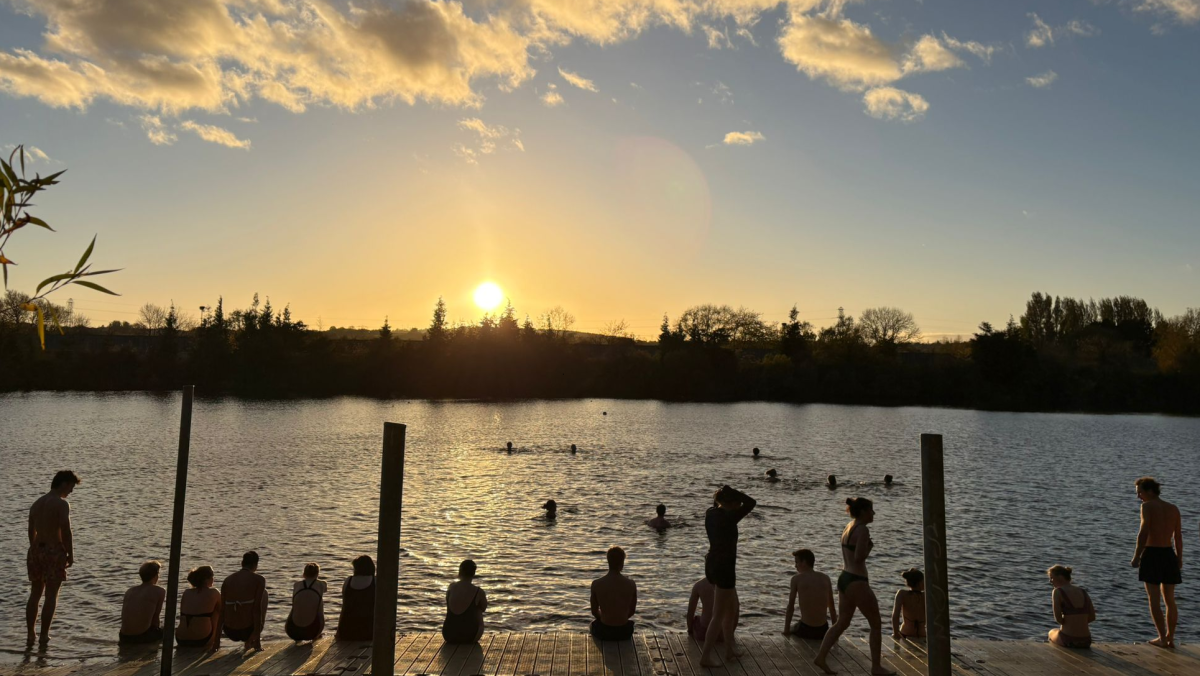When wandering through Port Meadow in search of aesthetics, welfare, or romance, you might come across some students more committed to this whimsical endeavor – the Oxford Wild Swimming Society. While not an official university society, the Oxford Wild Swimmers are a student-only group, gathering at the river in the golden light and morning mist to natter, sip tea, and have a dip. Amongst the increasing pace of term, the ever looming doom-scroll, and incoming seasonal depression, Michaelmas might be starting to seem bleak, but a taste of this lesser-known, wholesome society might alleviate this essay crisis. Who knows, maybe we’ll catch you there!
Across the country, wild swimming has been on the rise in recent years, with an estimated 7.5 million people swimming in the wild waters of the UK. And it’s not just that middle-aged woman from Devon! 14% of these swimmers were new in the past year, and over 90% cite ‘joy’ as the reason they swim, with the most common motivating factor for those responding to The Outdoor Swimmer being mental health and wellbeing.
This is a common theme across any conversation about wild swimming – it feels good! Even if ‘touching grass’ has become more of a chronically online term than a call to nature, the physical benefits of ‘touching water’ can’t be denied. Hippocrates claimed that water therapy relieved fatigue, and we’ve all heard of the ailing Victorian woman being ‘sent to the sea’. They weren’t wrong. Cold water swimming can lower your blood pressure, have antidepressant effects, strengthen the immune system, and lower stress levels, through ‘resetting’ levels of cortisol, or ‘the stress hormone’. The 1.5k followers of OWSS form a part of those 7.5 million, and you’ll catch them wandering down to the river as the Jericho coffee shops open their doors. Apparently, they hold the key to fighting both 5th week blues and freshers flu—what have we been sleeping on here?
But, of course, the student toil wouldn’t let us off that easily! Despite the popularity and clear benefits of wild swimming, the Thames is deeply affected by water pollution. North of Oxford lie Cassington and Witney Sewage Treatment Works, the source of periodic sewage discharge into our river. Sewage, along with other pollutants from industries like agriculture, have caused poor ecological health in 46 out of Oxfordshire’s 48 waterbodies and rivers. Unfortunately, this is far from unusual for England’s waterways. There were 592,478 sewage discharges occurring across the country in 2024. In response, campaigns like Surfers Against Sewage are holding water companies accountable and monitoring water quality themselves with maps which are a familiar friend to the wild swimmer.OWSS checks every map available, including Thames Water’s, before each swim to ensure the water quality. They have been in contact with Surfers Against Sewage and RiverAction to organise a meeting with the water company and discuss their ongoing malpractice.
Thames21 have successfully campaigned for the creation of a designated bathing area at Wolvercote Mill Stream, to the North of the OWSS’ normal swim spot in Port Meadow. The founders of OWSS were involved in this campaign, legally holding both the Environmental Agency and Thames Water accountable to test the water. Notably, water quality did improve in Trinity 2025, with only a single sewage discharge affecting the tri-weekly swims of the society.
Wandering out of Oxford’s awakening city centre and venturing into the wilder spaces of Port Meadow and Hinksey is a wonderful escape for any overwhelmed student. The Outdoor Swimmer reported that 69.4% of outdoor swimmers said that it was “essential or very important to their mental health” and 52% enjoyed it “more than they expected” (don’t worry – the other 47% liked it “as much as they expected”).The joy of quite literally immersing yourself in nature is evident, and the society’s swim coordination and safety briefings are more than reassuring. OWSS grows each term with members transformed from reluctant tag-alongs to happy regulars – perhaps it’s that reduced cortisol. Water quality is central to OWSS, and the majority of successful fights for water quality in our rivers are down to local campaigns. It is vital that this work is continued, to protect our waterways, our past-times, and our bathers. And if all you’re looking for is a good photo, the aesthetics, welfare, and romance of it all is hard to deny from their Instagram.
This hidden gem of an Oxford society runs three swims a week, charging no membership fee. They see members ebb and flow with deadlines and temperatures, welcoming anyone to any morning that takes their fancy. On that note, Oxford Wild Swimming Society would like to invite you down to the water to fight those pesky blues, give your deadlines a well deserved swerve, and find yourself both aesthetically, and scientifically, better for it.

